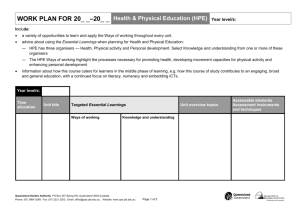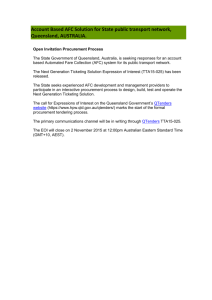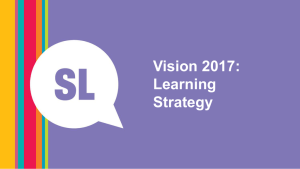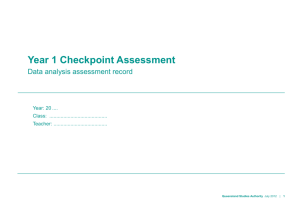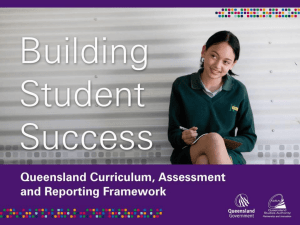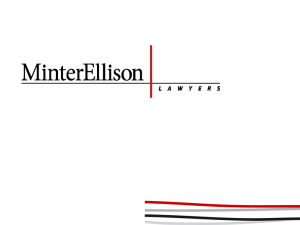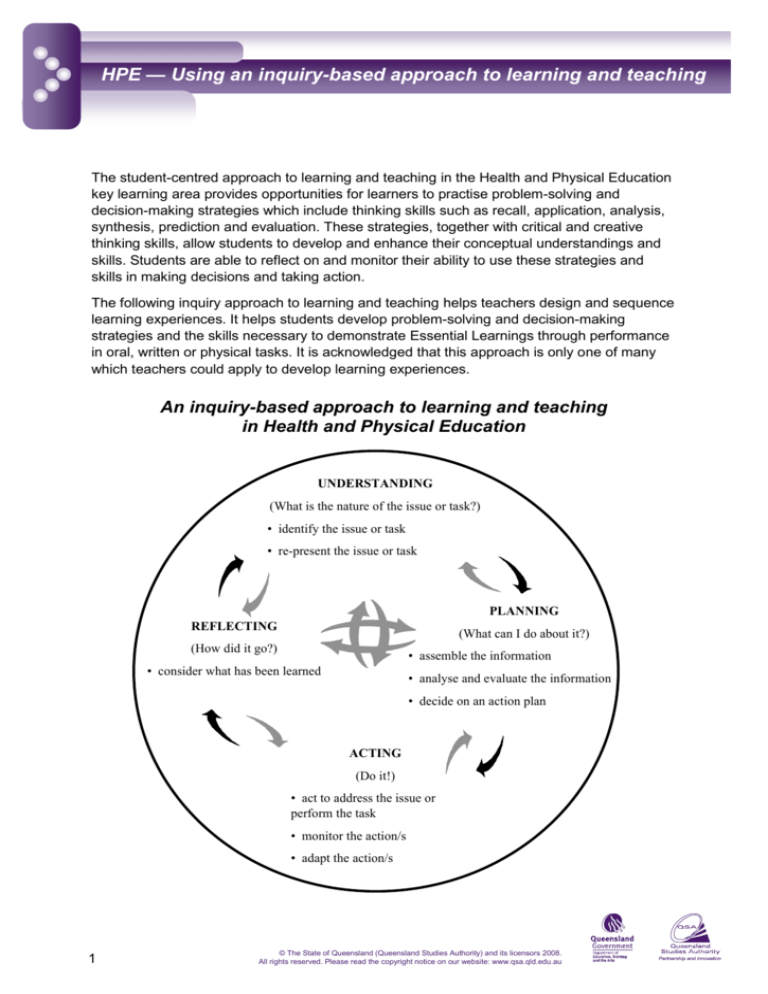
HPE — Using an inquiry-based approach to learning and teaching
The student-centred approach to learning and teaching in the Health and Physical Education
key learning area provides opportunities for learners to practise problem-solving and
decision-making strategies which include thinking skills such as recall, application, analysis,
synthesis, prediction and evaluation. These strategies, together with critical and creative
thinking skills, allow students to develop and enhance their conceptual understandings and
skills. Students are able to reflect on and monitor their ability to use these strategies and
skills in making decisions and taking action.
The following inquiry approach to learning and teaching helps teachers design and sequence
learning experiences. It helps students develop problem-solving and decision-making
strategies and the skills necessary to demonstrate Essential Learnings through performance
in oral, written or physical tasks. It is acknowledged that this approach is only one of many
which teachers could apply to develop learning experiences.
An inquiry-based approach to learning and teaching
in Health and Physical Education
UNDERSTANDING
(What is the nature of the issue or task?)
• identify the issue or task
• re-present the issue or task
PLANNING
REFLECTING
(What can I do about it?)
(How did it go?)
• assemble the information
• consider what has been learned
• analyse and evaluate the information
• decide on an action plan
ACTING
(Do it!)
• act to address the issue or
perform the task
• monitor the action/s
• adapt the action/s
1
© The State of Queensland (Queensland Studies Authority) and its licensors 2008.
All rights reserved. Please read the copyright notice on our website: www.qsa.qld.edu.au
HPE — Using an inquiry-based approach to learning and teaching
The approach is presented in four phases:
1. Understanding
2. Planning
3. Acting
4. Reflecting.
Each phase is integral to the successful completion of an investigative process. Progression
through the process (as suggested by the bold arrows in the diagram), can be interrupted at
any point to return to a prior step (as illustrated by the shaded arrows). Within each phase,
the thinking skills of recall, application, analysis, synthesis, prediction and evaluation play a
role. These skills are used to frame learning experiences within each of the four phases.
To develop appropriate activities within the inquiry-based approach, it is important to firstly
identify the Essential Learnings to be addressed.
Phases of the inquiry-based approach
The steps that contribute to each phase of the inquiry-based approach are identified in the
following descriptions of the phases. Not all steps would necessarily be used in all instances.
Understanding phase
This phase involves two steps — identifying the topic, issue or task, and then gathering the
information needed to explore it.
Identify the topic, issue or task
Ideally, the teacher and students negotiate the topic or issue to be explored or the task to be
completed. Alternatively, it could be introduced to the students in a way that enables them to
answer the question: Why should we investigate the issue or engage in the task?
In answering the question, students should be able to explain the relationship of the issue,
topic or task to their own or others’ health, physical activity or personal development. This
phase could involve several learning experiences that enable students to recognise the topic,
issue or task as worthy of further exploration or completion.
Gathering information
To understand the topic, issue or task, students are likely to need further information. For
example, students might need to explore:
ways in which the issue is a problem, and the extent to which it affects them or others
the skills needed to perform the task, and their own level of competence in these skills.
2
© The State of Queensland (Queensland Studies Authority) and its licensors 2008.
All rights reserved. Please read the copyright notice on our website: www.qsa.qld.edu.au
HPE — Using an inquiry-based approach to learning and teaching
Questions that could provide a framework for gathering such information include:
What do I already know about the topic, issue or task?
How do I feel about this topic, issue or task?
What are our attitudes to this topic, issue or task?
What else do I need to find out about this topic, issue or task?
Where can I find this information or acquire the necessary skills?
Planning phase
Planning requires students to interpret, analyse and review the information to set goals and
develop an action plan.
Interpretation, analysis and review of information
The following questions might help students to interpret, analyse and review the information
they have collected:
Have I collected appropriate and relevant information?
Do I have the necessary skills to explore the topic or issue, or complete the task?
Is the information accurate, unbiased and useful?
What relationships or trends exist in the information?
What are the implications for health, physical activity and/or personal development?
Can I manipulate and re-present the information in a meaningful manner?
Whose view is heard/not heard in the information? Who else’s view should be examined?
Making decisions and/or setting goals
As a result of their interpretation, analysis and review of information, students should be able
to decide on appropriate actions to take in relation to the topic, issue or task. They consider
the alternatives for action, choose an alternative and set goals. Their success in achieving
these goals should be easily measured. The following questions could guide students in
setting goals:
Are my goals specific?
How can I determine whether I have achieved my goals?
Are my goals achievable?
Are my goals relevant to the issue, topic or task?
Have I set some timelines?
What skills, resources or amount of time might be necessary to achieve the goal or
complete the task?
Can we acquire the necessary skills or resources to achieve the goal?
Sometimes goals will relate to personal behaviours, while other times they will relate to
promoting the health and wellbeing of others. Sometimes students will act independently,
and sometimes they will act collaboratively to achieve their goals.
3
© The State of Queensland (Queensland Studies Authority) and its licensors 2008.
All rights reserved. Please read the copyright notice on our website: www.qsa.qld.edu.au
HPE — Using an inquiry-based approach to learning and teaching
Deciding on a plan to take action
Achieving a goal is not always easy, particularly if the goal is related to changing a behaviour
related to personal health or physical activity. These behaviours are often shaped over a long
period of time by a variety of social, emotional, cultural and economic factors. Some factors
will be barriers to achieving goals while others will help in achieving goals. Factors that can
either impede or help in the achievement of goals include personal skills (for example motor
coordination, communication skills, assertiveness skills), attitudes, values and knowledge (for
example, knowledge of the impact of drugs, food or hygiene on health) as well as
sociocultural factors such as home, school, peers and money.
Students need to:
identify factors that impede or assist in their achievement of goals
develop strategies to overcome factors that impede and to support factors that assist
achievement of goals
change or modify goals when necessary
(For example, a student might set a goal to swim the length of the pool, but due to limited
opportunities for practice, change the goal to swim the width of the pool. Or a result of
evaluating their food intake, a student might set a goal to include more salad vegetables in
their school lunch. If there is no way to keep the vegetables refrigerated at schools, the
student may decide to increase the amount of salad vegetables they eat at home or
advocate for better refrigeration facilities for student’s lunches at school.)
identify the skills needed to achieve their goals, and practise these skills.
(For example, students may need to learn skills for resisting peer pressure, monitoring
cardiovascular activity or developing public awareness campaigns, or techniques for
breathing when swimming — all of which take time. They need to understand and accept
that bringing about change requires planning and time.
The following questions might help students with their planning:
What factors will support and/or what factors will impede the successful achievement of
goals or completion of tasks?
How can these factors be either promoted or overcome?
What are the possible alternatives for achieving the goal or completing the task?
What are the possible, probable and preferable outcomes or consequences of each
alternative?
Are personal and group values and attitudes taken into consideration?
Which is the preferred option for reaching the goal or completing the task?
4
© The State of Queensland (Queensland Studies Authority) and its licensors 2008.
All rights reserved. Please read the copyright notice on our website: www.qsa.qld.edu.au
HPE — Using an inquiry-based approach to learning and teaching
Acting phase
This phase involves implementing plans that may result in a performance or the presentation
of findings. While working towards their goals, students learn about themselves and others,
the control that they and others have over their health and physical activity, and their
relationships with other people and their environments. Real-life practice builds knowledge,
confidence and skills for future action. Students monitor their actions and modify them where
necessary.
Reflecting phase
This phase requires students to consider how they applied decision-making and problemsolving strategies and thinking skills to explore the topic or issue, or complete the task.
Teachers and students are encouraged to assess their learning.
The following questions might help students in their reflection:
Has my own knowledge/attitude towards the topic, issue or task changed?
How do I feel about the topic, issue or task now?
Did I answer the questions associated with the topic or issue or complete all the
requirements of the task?
How reasonable/accurate was the solution or performance?
What are the implications of, for example, my actions or community expectations, for now
and the future?
What helped me to succeed?
What hindered my success?
How effective or efficient was the process of “understand, plan, act and reflect”?
What else would I like to know about the topic, issue or task?
Adapted from: Health and Physical Education Years 1 to 10 Sourcebook Guidelines, Queensland School Curriculum Council 1999.
5
© The State of Queensland (Queensland Studies Authority) and its licensors 2008.
All rights reserved. Please read the copyright notice on our website: www.qsa.qld.edu.au


